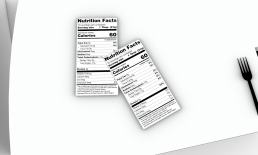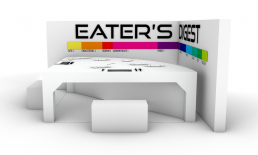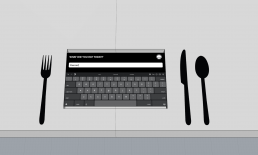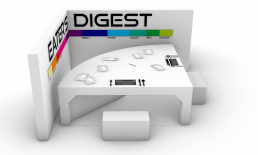If food is essential for our survival- How do we feed our cities?
Critical Context
Modern lifestyle has gotten us off the right track, with fast foods, alcohol abuse, drug dependencies, a polluted environment and high-tech stress. Nature intended to fuel our inner healing force with the right natural substances to enable the body to function to its fullest potential. So how do we educate and empower a community of their diet?
An experimental survey invites eaters to sit and enter in their last meal eaten with Eater’s Digest. The average of all meals entered is converted into their individual nutritional composition, visualizing how a community is currently eating. Eaters are also invited to print their own Nutritional Fact labels, communicating information of their on meals.
Data Acquisition & Preparation
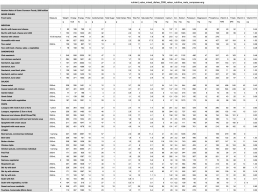
Canadian Nutrient File: Nutrient Values of Some Common Foods. Published by Health Canada, the Nutrient Value of Some Common Foods (NVSCF) provides Canadians with a resource that lists 19 nutrients for 1000 of the most commonly consumed foods in Canada.
Data Modelling & Visualization
A live horizontal bar graph clearly communicates how a community is eating, the nutritional composition of their diets.
Data Analysis & Reflection
Community-wide nutritional information is significant data. It can help us analyze deficiencies in diet, understand resources that a community may need to implement, and help us make informed food choices through a better understanding of the nutrient content of the foods we eat. This survey is location variable, and can be used to compare and contrast various community diets – based on location, climate, and culture. Nutritional Fact Labels serves its purpose in breaking down the nutritional composition of individual foods. Eater’s Digest helps bring new perspectives on what we consume, and why. Giving an opportunity for social innovation that builds resilient communities.

Michael Peter, 1998
Third-culture citizen with a global perspective, not afraid of taking risks or embracing uncertainty. His work is widely interdisciplinary, focused on building resilient societies, with experience in ceramics, interactive media, service design and, digital fabrication. His design process is greatly affected by research through experimentation; uncovering the new. He has a strong sense of fairness, justice, and respect for the dignity of individuals and communities through his designs. He is also highly reflective, able to assess and understand his strengths and limitations in order to support his learning and personal development. Michael is currently pursuing MRes Design at the Royal College of Art. Every day he looks for the excitement of what may occur in the realm of all possibilities.
www.linkedin.com/mikeiszen
